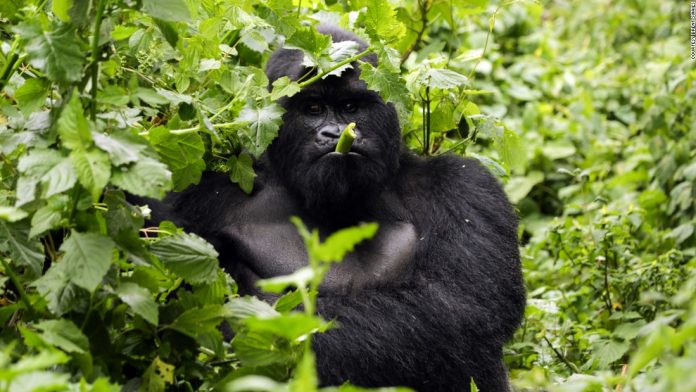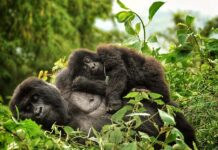This Rwanda safari will take you to Akagera National Park for the big five experience, Volcanoes National Park for gorilla trekking as well as golden monkey trekking and end with a city tour that will enlighten you on the historical and cultural sites around the city.
The moment you land on the land of thousand hills, you will be welcomed by our driver guide who will transfer you to your respective hotel where you will have dinner and overnight. Early in the morning after breakfast, you will be picked up and head to Akagera National Park where you will have your insight on the Rwanda wildlife safari, boat ride and walking safari.
Akagera National Park is nature’s blend of swamps, lakes, savannah plains and a rugged terrain encircled by neatly terraced hills. This scenic site was gazetted as a national park in 1934 and named after the river that runs through it; River Kagera. It is located north east of Rwanda bordering Tanzania. The Park boasts of diverse vegetation zones and abounds in mammal and bird species some of which can only be viewed in Akagera National Park.
You will take lunch at your lodge (Magashi camp) and then head for the afternoon game drive. You will be guided by a tour guide who has knowledge of where the wildlife can be seen at ease. This will be the beginning of your tour into this park. What ever is missed out in this afternoon drive will be compensated for in the next day. Back to lodge for dinner and overnight.
Early in the morning after breakfast, go for a morning game drive, you get to be driven along the tracks, through the green savannah plains, past wide-leaved woodlands and into the habitat of bountiful mammal species in the Akagera National Park.
Your tour guide knows the areas where most animals usually spend their day and will endeavour to drive by. Some of the animals to look out for while on a day game drive include; The Defassa Water buck, Topis, Bohor Reed bucks, Oribis, Semi-Aquatic Sitatunga, Eland, Giraffes, Buffaloes, Elephants, Lions and the recently reintroduced Rhinos are some of the mammals found in the park. Back to lodge for lunch then in the afternoon, go for a boat cruise.
A boat safari is a relaxing yet rewarding way to view wildlife. It is an even more rewarding experience when on the lake. Lake Ihema is the second largest lake in Rwanda known for its abundant hippo population and crocodile dotted shores.
The boat safari on Lake Ihema offers the opportunity to take up-close photos of these animals. As other animals come to the lake for a drink or bath, you can take a look at those that you may have missed while out on a game drive in the wild. Back to lodge for dinner and overnight.
The next morning after breakfast, transfer to Volcanoes National Park for gorilla as well as IbyI’wacu cultural tour. Check in your lodge for refreshing and lunch then head for that cultural tour.
A cultural tour to IbyI’wacu cultural village is one of the key features that make Rwanda safaris exceptional experiences. IbyI’wacu Cultural Village gives you a rare chance to meet local people, in their environment, with a taste of our culture and traditions. Be genuinely welcomed by the community as a special visitor while they proudly present to your aspects of their traditions and beliefs. The only way to get to know people, is getting close and interacting with local people, and taking part in their daily activities and most of all with them.
Enjoy different types of traditional dances like Intore dance and famous songs of the gorillas sang by the famous Ngayabatema while listening to the melody produced by traditional musical instruments including African drums.
Listen to interesting stories about traditional medicine from a local traditional healer and get to know how medicinal trees, shrubs, grass are used to cure local patients. Back to lodge for dinner and overnight.
Early in the morning after breakfast, head to the park headquarter for briefing about what to expect during gorilla trekking safari experience. what you should expect and which gorilla group you will encounter. After the briefing, you’ll be split into small restricted groups of 8, with a local expert tracker guide and two armed rangers (for security against jungle uncertainties) and transported to the trailhead into the jungle.
Hike up uneven terrain into the thick misty jungle with unmarked trails to find the gorillas. Your physical fitness should be at least moderate to pull off this adventure. You can hire a local porter to help you navigate the steep hike if you don’t trust your physical fitness since it’s a great way to support the communities that live around the park directly. Porters come from villages around Volcanoes National Park that used to depend on the forest for livelihood entirely.
It takes from 30min to 6hours searching for the gorillas. When you find the gorilla family, expect to spend at least an hour watching the gorillas eat, groom, socialize and ignore your presence. Your consciousness determines the quality of experience when staying with the gorillas for one hour; try to keep your attention to photography to minimal. However, your guide will furnish you with stories and information throughout your stay and will announce when you’ve used up your time. Descend to the headquarter for you trekking certificate then back to the lodge for lunch.
Head back to Kigali and take visits to the genocide memorial a permanent National genocide memorial in remembrance of more than one million victims of the 1994 Genocide against the Tutsi. The memorial is a place of remembrance and learning where more than 250,000 victims of the Genocide have been laid to rest. Many people who lost loved ones in the Genocide visit to remember and grieve. There is no entrance fee and donations are gratefully accepted.
Visit the Kandt House Museum offering an insight into Rwandan history, with three distinct exhibitions filled with old photographs and artifacts. The first illustrates the social, economic, and political aspects of life in Rwanda before the colonial period.
The second is dedicated to the events of the colonial era, first under Germany and later under Belgium; this is of particular interest since the exhibit shows how racial divisions were exploited by colonial authorities to perpetuate their own power, thereby sowing the seeds for the later genocide.
The third section covers the history of Kigali, including its establishment as the Rwandan capital in 1962. Kandt House Museum is open daily from 8 a.m. to 6 p.m.; entry costs about $6. After this then transfer to airport for your flight back home.






